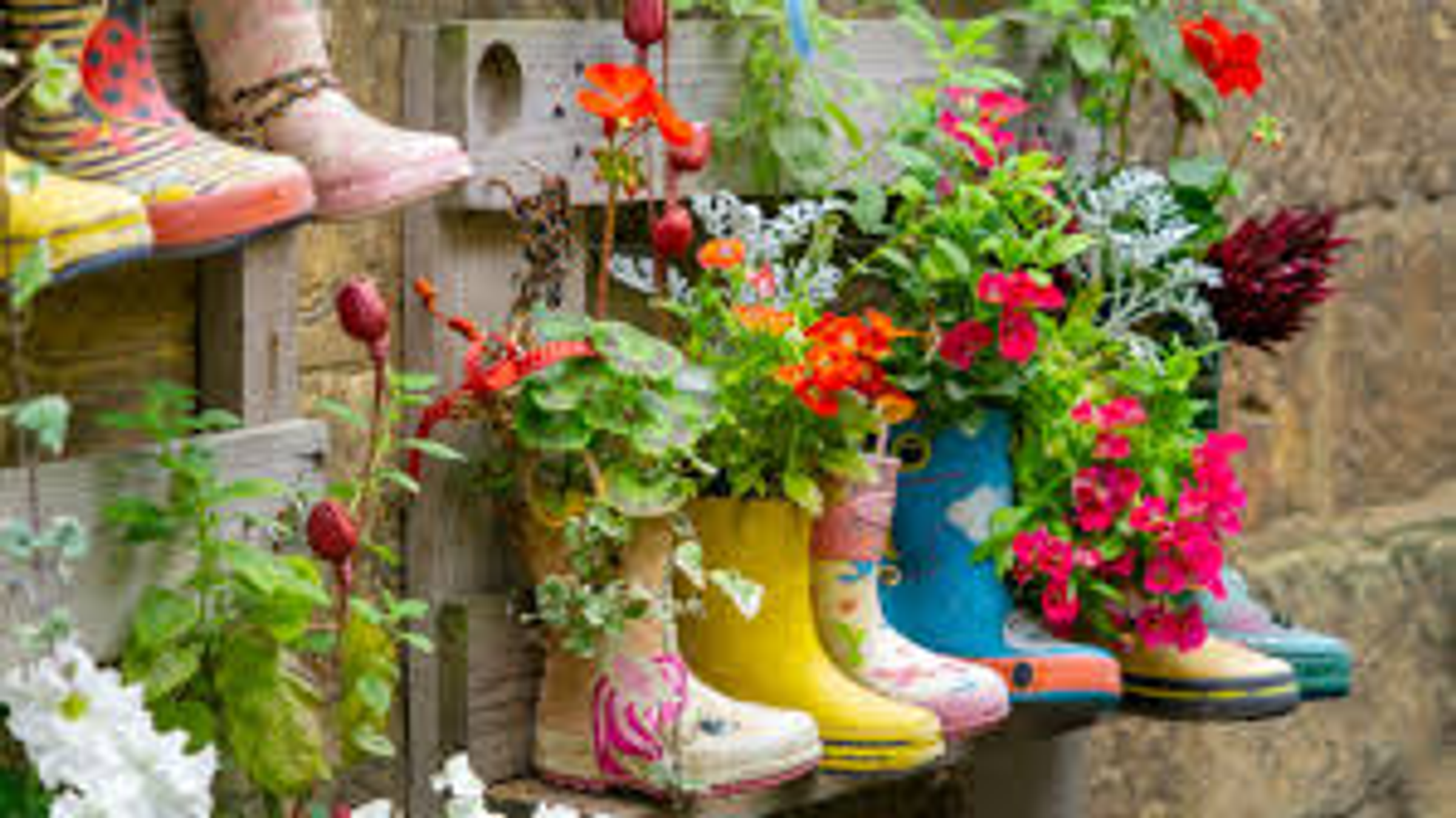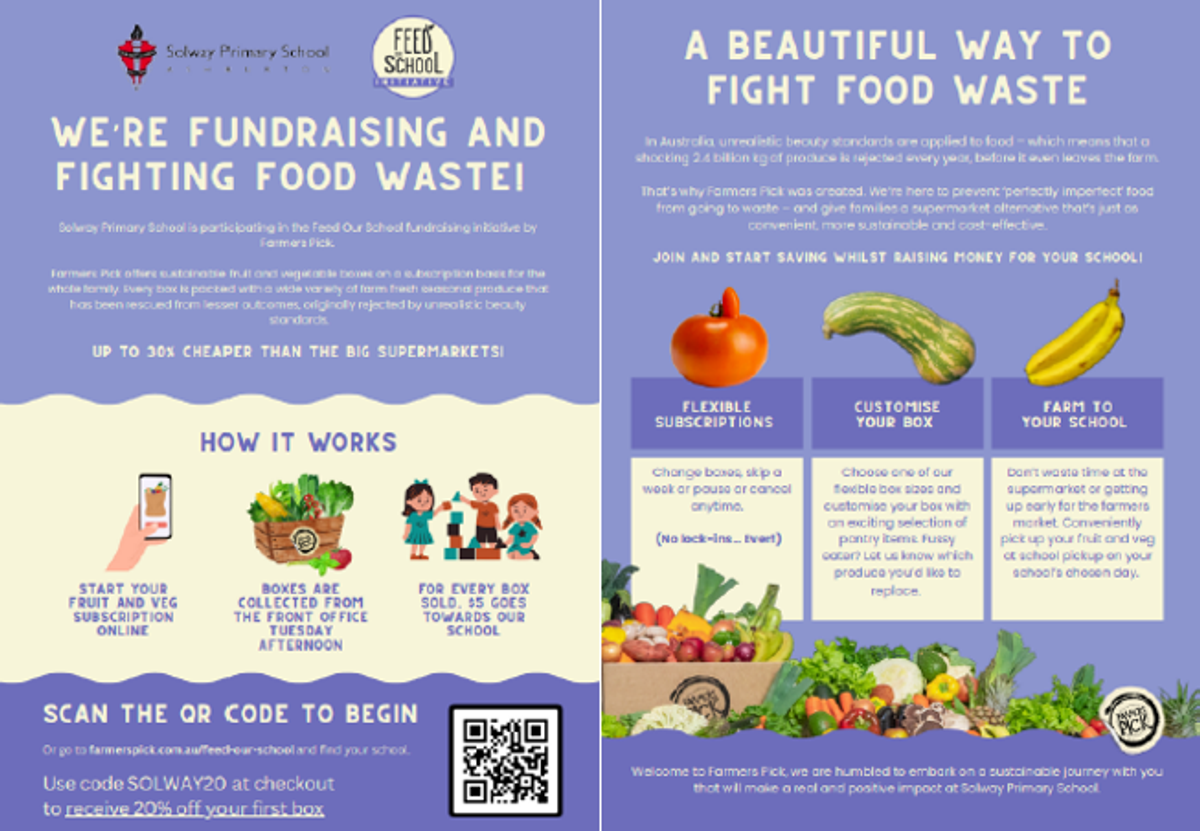Sustainability

Environmental Calendar- September
1- First Day of Spring
1- National Wattle Day
6- National Walk to Work Day
7- National Threatened Species Day
16- International Day of the Preservation of the Ozone Layer
18 - Water Monitoring Day
16-22- National Organic Week
Farmer’s Pick started at Solway this term, and with every order $5 was given to Solway. The Green Team has been working hard to come up with ideas of what to spend this money on. It was decided that the funds would go to rejuvenating the Kitchen Garden, to make it a welcoming and joyful experience for all. As we bring together a variety of ideas, we are seeking gumboot donations. We would love to repurpose the gumboots you no longer fit, use or are too scared to put your foot into with the thought of a BIG spider residing in it!! If you have any gumboots or flowers you would like to donate to our mission, please contact Miss Danaher or Miss Smith.
If you are interested in Farmer’s Pick you can find more information below.
Farmer’s Pick- School Holidays
Please keep your eyes peeled for an email from Farmer’s Pick outlining your options over the school holidays. They aim to have this out later this week, or latest next week.
Early spring gardening tips from Boroondara Council.
My Smart Garden permaculture designer and educator, Kat Lavers has the below seasonal horticulture advice for early spring.
● Compost and fertilise:
Add a 3 - 5cm layer of compost to your veggie beds. Hungry crops like zucchini, tomatoes, corn, broccoli and cabbage will appreciate extra fertiliser, such as a handful (per square metre) of blood and bone, organic fertiliser or chook manure.
● Plant summer seeds and seedlings:
Be aware that the soil is probably not warm enough at the moment for capsicum, eggplant, chilli, cucumber and basil. Raise these in punnets in a warm microclimate and transplant into beds in October.
● Growing from seed:
This will give you quality plants that are value for money. Read more about growing from seed here.
● Plant perennials:
Plan ahead for next year's 'harvest gap' - the period before summer crops are ready. Plant perennials such as asparagus, globe artichokes, wild rocket, walking onions, sorrel, and perennial leeks which will be ready to harvest in September next year. Read more about perennial plants here.
● Plant beneficial flowers:
To combat caterpillars, aphids and whiteflies, plant flowers that attract beneficial insects like predatory wasps, hoverflies, ladybirds and lacewings. A mix of daisy shaped flowers including native Brachyscome daisies, umbrella shaped flowers like parsley and carrot, and other small flowers such as alyssum which can flower for most of the year.
EVENT- Billabong Bioblitz at Boroondara Council.
Moths, Spiders and Frogs Oh My! Join us for this family friendly event and help us put the amazing animals of Boroondara on the world map! This year, Boroondara is teaming up with councils across Greater Melbourne to participate in the Great Southern Bioblitz to collect valuable research data and showcase our unique biodiversity to the world.
Book your place to drop in any time between 4 pm and 6:30 pm and:
● Meet local animals up close in the native animal show.
● See local frogs on display and chat to a frog expert from Melbourne Water.
● See water bugs under a microscope and play frog bingo.
● Make a compostable pot and plant a seed to take home.
Book your place in a guided wildlife spotting activity:
● Krefft’s Glider Hollow Checks (older children and adults) 3 pm to 4 pm
● Kids Animal Adventure Walks 4 pm to 4:45 pm OR 5 pm to 5:45 pm
● Kids Scary Spider Walks 5pm to 5.30 pm OR 6 pm to 6:30 pm
● Dusk Walk and Talk (adults) 6 pm to 6:45 pm
● Night Walk and Talk (adults) 7 pm to 7:45 pm● Moth Spotting (all ages) 7 pm to 9 pm
When: Saturday 21 September
Where: Willsmere Billabong: Junction of Main Yarra Trail and Darebin Creek Trail,Willsmere Park, 27 Willow Grove, Kew East.
Cost: Free
Easy ways to help nature in Australia- Article
There are many things that every person can do to help nature in Australia, and lots of them are very easy and also provide benefits to you. Some easy and effective ways to help support nature and stop biodiversity loss outlined in the article include;
Choose sustainable seafood products
Overfishing impacts sustainability of stocks and other species through by- catch. Some fish in your supermarket or restaurant are much more sustainable choices than others. To help you chose more sustainable seafood look for the blue marine stewardship council (MSC) tick or green Aquaculture Stewardship Council (ASC) tick on seafood products when you shop. Or check out Australia’s Sustainable Seafood Guide, which is available as online or as an app.
Keep your dog on a leash in natural areas
Off-leash dogs disturb and attack native wildlife. When animals, like birds spend time fleeing dogs they miss out on time to eat, rest and feed their young. You can help your local wildlife by keeping your dog on a leash unless it is a designated dog off leash area offered by your local government. Keep your dog on leash everywhere else including beaches, rivers, and parks.
Plant and maintain a wildlife garden
Urban areas are important to many threatened species populations. Wildlife gardening helps provide important habitat and increases habitat connections between greenspaces. Increasing nature around you also has health and wellbeing benefits for people. If starting out, your local government or native nursery is often a great source of resources, advice and sometimes also free or inexpensive plants. As well as plants, there are a range of simple habitat features you can provide to help and encourage wildlife. For example, here are some tips for creating a lizard friendly garden.
Cut your light pollution
Man made lights at night have a wide range of serious negative impacts on wildlife. Youcan learn more about the impacts in this research summary report or on the AustralianGovernment's Lets switch of light pollution together! website. All lights that shineoutdoors towards the sky or horizon or on to plants and natural areas have an impact.So every extra outdoor light that you can turn off, leave on for less time, or makedimmer helps. You can also close your curtains at night to stop your indoor lights shining outside.
Desex your cat and keep it indoors or in a cat run
Research shows that every pet cat kept inside saves 110 native animals per year on average. There are around 55 pet cats per square kilometre in our suburbs. If they areallowed to roam outside their collective impact on wildlife is huge! Cat containment is awin-win-win solution for wildlife, cats and their owners. Cats kept securely containedindoors or in a run live longer, healthier lives, have fewer expensive vet bills and a farless likely to pass diseases to their owners. There are great tips on keeping your cat indoors on this RSPCA webpage.

